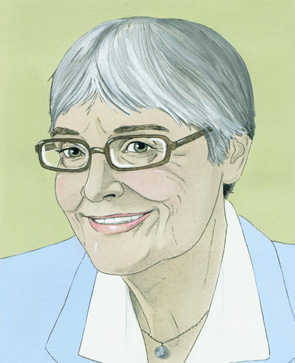
Five years ago, Theo Colborn broke her back in an accident. She has to admit it put some of her favorite pursuits out of reach. "I don't dare go whitewater rafting anymore," says Colborn, who turned 80 this year. "I can't even hike in the backcountry." But nothing, it seems, can slow down her work.
In the late 1980s, Colborn, having earned a Ph.D. in zoology at age 58 after a first career as a pharmacist, made a disturbing discovery. A wide variety of predators in the Great Lakes of North America — fish, birds, reptiles and mammals — were suffering from reproductive disorders. They were also contaminated with industrial chemicals that had one thing in common: at the molecular level, they were structurally similar to the hormone estrogen.
Colborn's conclusion: these chemicals, present in everything from pesticides to plastics to cosmetics, interfered with the animals' endocrine systems, where hormones are regulated. Most of her colleagues were skeptical, but Colborn plunged into a frenzy of research, uncovering earlier studies that nobody had paid sufficient attention to and analyzing tissue samples from across the U.S. and Canada. "We had gonads flying around the country," Colborn told TIME in a 1994 story. By then she'd been appointed senior scientist at the World Wildlife Fund, where she directed the Wildlife and Contaminants program.
Colborn's tireless research resulted in the groundbreaking 1996 book Our Stolen Future, and over the past decade she's won over many of the skeptics. "Endocrine disruption has become a distinct discipline of its own," says Colborn, who retired from the World Wildlife Fund in 2003 and returned to her Colorado home to found the Endocrine Disruption Exchange www.endocrinedisruption.com, a clearinghouse for research and information on the topic. "The evidence is now overwhelming that prenatal exposure can lead to irreversible disorders," Colborn asserts. This would explain "the pandemic of endocrine-related diseases we're seeing, especially in the northern hemisphere," she says. "One out of three children born today will develop diabetes — and it's one out of two if you're a minority. Thyroid problems are everywhere."
Colborn has also speculated that chemical pollutants are responsible for lower sperm counts among men in Europe, and has even linked them to autism. That last point is highly debatable. Nobody knows what causes autism; one theory even suggests it has to do with excessive TV viewing. But Colborn has never been shy in making speculative leaps about the effects of industrial pollutants — and, so far, it's been a losing wager to bet against her instincts and her relentless drive to back them up.